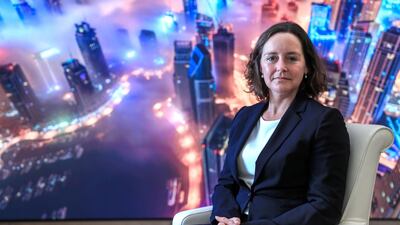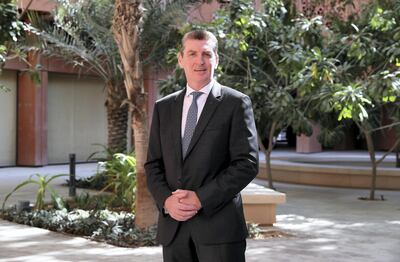As the UAE government pushes to fulfil its commitment to sustainable development goals, it is urging financial institutions and companies to do their part. As well as being socially responsible, green finance offers the benefits of increased capital at lower cost, investor confidence that risks are mitigated and long-term profitability.
“Sustainable business should not only be morally better, but also better from a profits perspective,” says Leonie Schreve, global head of sustainable finance for ING. “Sustainable in the long run means you’re still in business, so [it’s] creating the economy for tomorrow.”
Sustainability has been high on the national agenda lately. Abu Dhabi Sustainability Week, including the inaugural Abu Dhabi Sustainable Finance Forum, took place last month. Abu Dhabi Global Markets signed a declaration with 25 signatories, including leading banks and financial institutions, committed to driving sustainable finance and investment.
The Dubai Declaration of 2018, launched during the World Green Economy Summit that took place in October, put an emphasis on green capital. One of Dubai's major green projects under development is the Mohammed bin Rashid Al Maktoum Solar Park, the world's largest single-site solar park.
The UAE was one of the first countries to ratify the Paris Agreement on climate change action in 2015. Since then, the government launched the National Climate Change Plan, which targets ‘green’ energy to meet 27 per cent of the country’s energy needs by 2021 and 50 per cent by 2050.
The country also joined the General Assembly member nations in adopting the 2030 Agenda for Sustainable Development that includes 17 Sustainable Development Goals (SDGs). Among the goals are no poverty and zero hunger, as well as climate action, affordable and clean energy, and responsible consumption and production.
With such policy initiatives, the government is creating market incentives for green investments. In 2016, DEWA created the Dh100 billion Dubai Green Fund to finance environmentally-friendly projects at favourable interest rates.
On the private sector side, First Abu Dhabi Bank issued a five-year $587 million (Dh2.16bn) green bond - the region’s first - in March 2017, and has set aside $10bn for financing green businesses over the course of 10 years. Abu Dhabi clean energy firm Masdar created the Middle East’s first green revolving credit facility in October.
“There is a very good momentum and awareness level in the market at this moment,” says Ms Schreve, who visited the UAE last month to speak to clients about the viability of sustainable finance.
Green bonds allow investors to invest in sustainable projects while offering issuers affordable funding to finance these projects. Globally, the green bonds market was $167.3bn in 2018 and is estimated to grow to $250bn in 2019, according to the Climate Bonds Initiative, a non-profit organisation dedicated to mobilising the $100 trillion bond market for climate change solutions.
The UAE was among 10 new entrants to the green bonds market in 2017, along with such countries as Singapore and Switzerland, according to FAB’s first Green Bond Report issued in June 2018.
There is still work to be done, though. KPMG’s UAE survey of corporate responsibility reporting 2017 found that out of the country’s top 100 companies by revenue, only three met the scoring criteria of understanding, prioritising and measuring the SDGs. Less than half of the companies reported their sustainability performance, but that still reflected an increase of 22 per cent compared to 2016.
“Many companies recognise the need to consider the SDGs, but many still struggle with how do you achieve and support the SDGs,” says report co-author Hanife Ymer, director in charge of sustainability for KPMG Lower Gulf.
KPMG LG works “across the whole sustainability life cycle” with the private sector, governments and non-governmental organisations, says Ms Ymer. For the FAB green bond, KPMG provided third party independent assurance that it adhered to the ICMA's (International Capital Market Association's) Green Bond Principles.
Investors can then feel at ease that certain guidelines involved in launching a credible green bond are being followed. Abu Dhabi Securities Exchange and Dubai Financial Market are both now members of the Sustainable Stock Exchanges Initiative, a platform that encourages corporate transparency on ESG (environmental, social and corporate governance) issues. The FAB green bond is a publicly listed instrument, creating the opportunity for socially-minded investors to put capital towards sustainable initiatives.
“These sophisticated institutional investors are making informed decisions about where they allocate their money, their funding, their capital based not on just financial returns, but also ‘Do you have good governance? Are you addressing environmental impact and climate change risk?’ They’re all interlinked, and it’s becoming very clear now how they are interlinked,” says Ms Ymer.
Minimising risks linked to environmental and social impact is another consideration. The World Economic Forum’s 2019 Global Risk report highlighted environmental impact as one of the key risk areas to consider for the third year in a row, says Ms Ymer.
“So one of the drivers is that it’s just good risk management to start thinking about some of the impacts that are associated with sustainability risk,” she adds.
ING, one of the signatories to the Abu Dhabi Global Markets Declaration, seeks to double its global portfolio of sustainable activities in 2022 based on the end-2017 portfolio, according to Ms Schreve. Sustainable financing currently accounts for approximately 15 per cent of the bank’s current portfolio.
“If I look at companies that score better in the sustainability ratings, they often also have a better credit risk,” says Ms Schreve. “They are better managed companies.”
Among the financial instruments offered by ING is a sustainability improvement loan, whereby it provides pricing incentives when a company meets a certain improvement and, on the other hand, a penalty if they do not make that improvement.
Often renewable energy projects are also seen as more cost-effective.
“It is generally accepted and known that you can now build renewable energy solar and wind projects at prices in most countries that are below the cost of generating power through traditional fossil fuels,” says Niall Hannigan, Masdar’s chief financial officer.
In December, Masdar, together with its partners Equinor and China Resources Group, announced the largest every refinancing of an offshore wind farm in the UK for £1.35bn (Dh6.4bn), of which £706m was raised through a green bond. The bond was oversubscribed, attracting strong interest from leading UK and US investors, according to Mr Hannigan.
Masdar’s $75m green revolving credit facility was arranged with FAB, Societe Generale, Sumitomo Mitsui Banking Corporation and UniCredit. The benefit of the three-year facility is that it is a line of credit with an established maximum amount where the business has access to the funds at any time when needed.
“The key to the revolver is that it is available to you to draw from immediately at any given point in time,” says Mr Hannigan. “It offers you maximum flexibility, it allows you to be agile, and it allows you as a result of that to be more competitive.”
Mr Hannigan says that while sustainable financing is still at its relatively early stages in the region, he expects to see significant growth in coming years.
“Lenders have an increasing appetite, capital markets have an increasing appetite, and investors have an increasing appetite to divert their capital towards renewable energy and sustainable projects,” he says.



